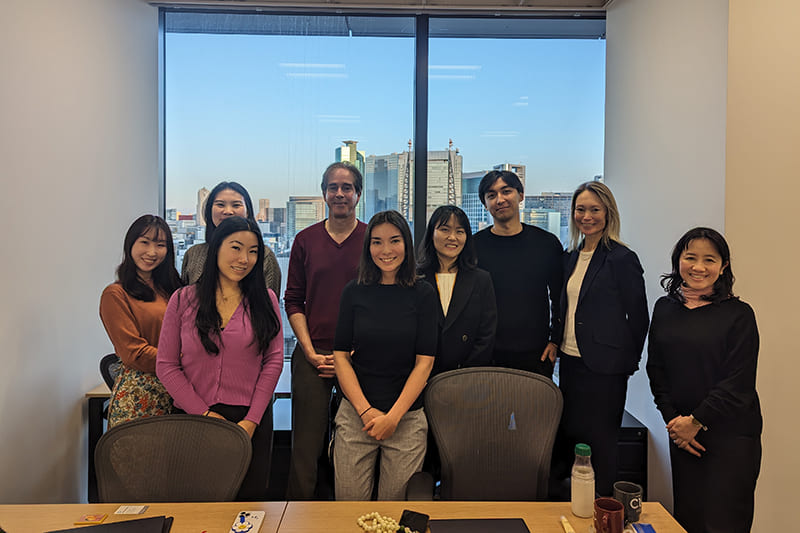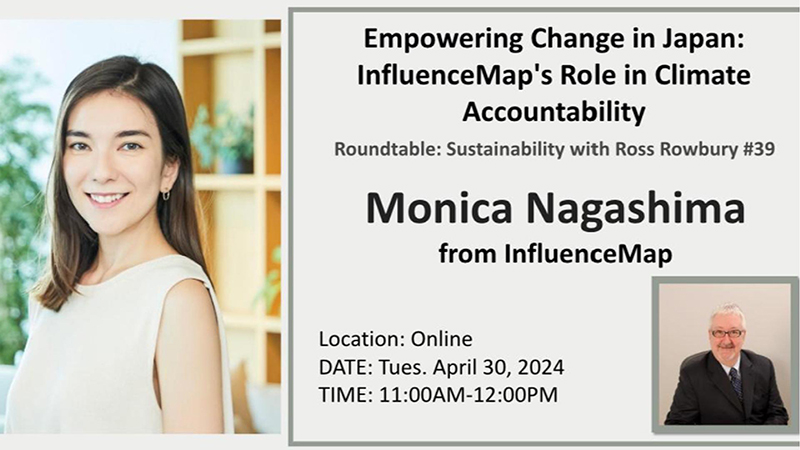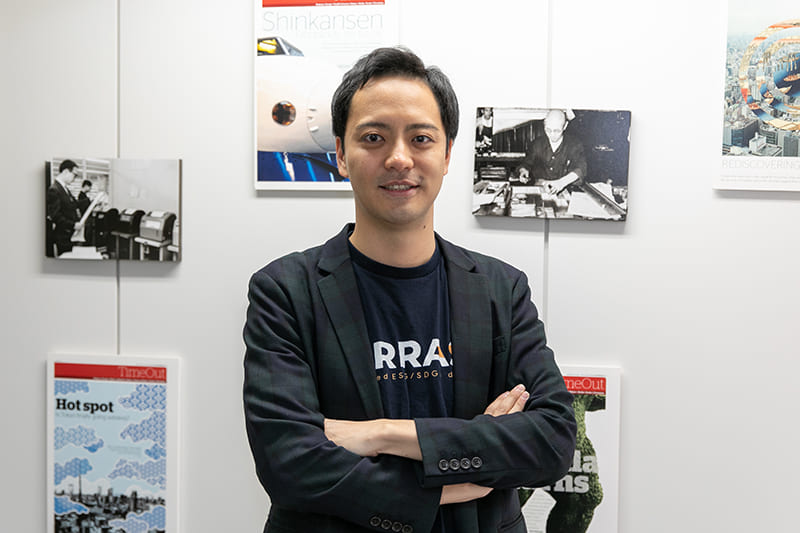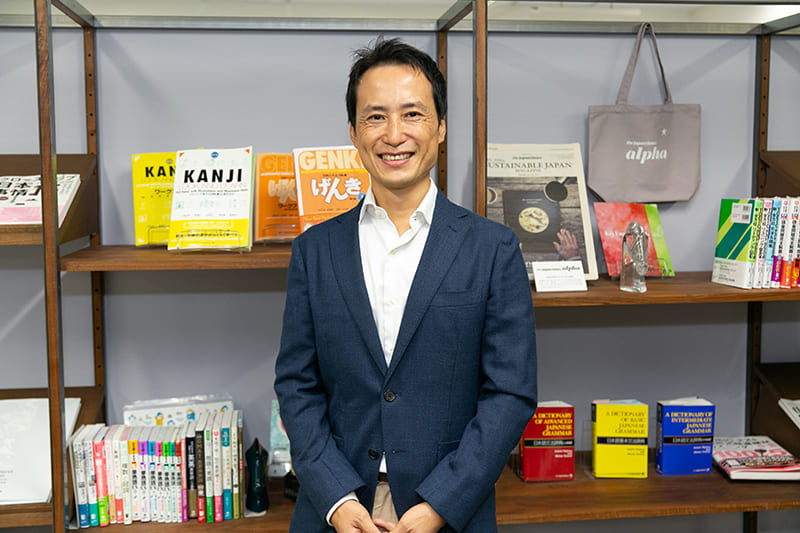May 17, 2024
Monitoring corporate climate policy influence

Among Monica Nagashima’s many ambitions as the climate think tank InfluenceMap’s Japan country manager, one is to eventually not have to explain what “policy influencing” actually is.
Founded in London in 2015, the independent climate think tank has quickly become a global organization for researching and scoring corporate lobbying on climate policy, with offices in the United States, South Korea and Japan. It runs a number of open-source data platforms that track how companies lobby on climate policy (LobbyMap) and assess financial institutions across a number of climate metrics (FinanceMap).
Nagashima took time out from her busy schedule to speak with Ross Rowbury for The Japan Times Roundtable’s 39th incarnation about InfluenceMap’s unique approach to the climate crisis. Rowbury began by asking what kind of initiatives InfluenceMap is instigating in Japan.
A new investing conversation
“In Japan, we are mostly looking at how companies are influencing policy, and we work very closely with the Climate Action 100+ investor network,” began Nagashima, referring to the largest global investor-driven initiative engaging companies to improve their climate governance. “InfluenceMap is a technical adviser that provides a number of metrics to investors, who then use them in their engagements, which range from conversations with companies to shareholder resolutions.”
Nagashima is confident that shareholders are starting to take notice: “While in the climate space, policy engagement might seem like a new subject, investors are paying close attention, and conversations about about how companies are engaging on climate policy are picking up here in Japan.”
Nagashima believes that part of the genesis for InfluenceMap stemmed from an investor need for the type of information that InfluenceMap could provide. “Investors could see a company’s stated CO2 emissions reduction goals, but without changing national policy, over which companies have enormous influence, it’s hard to see how these companies plan to reach net zero, so InfluenceMap was probably the first organization that systematically started studying this issue and created the process of cataloging, scoring and ranking how companies are influencing climate policy.”
Journey to climate work
Nagashima was born in Japan but grew up in what she describes as an idyllic environment in the suburbs of Kyiv, surrounded by apple and cherry trees and neighbors who kept goats. “I was always very interested in nature and preservation, but I guess I never really thought of specifically working in this field.”
Initially majoring in biology and chemistry, but in a course with a multidisciplinary approach, she found herself taking classes in a lot of other subjects and ended up in the United States on a State Department program through which she studied environmental leadership at a U.S. institute. “A group of students spent five weeks traveling through really beautiful natural areas such as Colorado and Hawaii,” she said. “All the time we were trying to come up with business cases on how to preserve nature.”
She realized that these landscapes were in danger, despite no one specifically trying to destroy them. The challenge was to find a way to deal with the way the economy was run while still preserving nature. She remembers visiting a turtle habitat in Hawaii and realizing that while the beach could always be kept pristine, it wouldn’t stop climate change from irreparably affecting the acidity of the ocean beyond: “Simply making sure we have a planet to live on was an idea that was planted in my mind during that trip, so when I got back to Japan I kept thinking about how I could retool my bachelor’s degree — I really wanted to do something.”

Industry and ‘taboo’ in Japan
One of the issues facing InfluenceMap’s work in Asia and Japan is that corporate influence is often overlooked. “Lobbying in Japan and Asia can sometimes be a taboo subject,” Nagashima said, adding that even if a company is not engaged in direct advocacy, if it belongs to an industry group it is in fact partaking in lobbying.
“Any company that belongs to a third-party or industry group has to be aware of what that industry group is advocating, especially if it’s a group that has lots of different sectors, as they tend to take the lowest-common-denominator position on climate,” she said. While individual companies and their investors may hold high objectives on climate targets, they are often burdened by the cross-sectional nature of the various players within the industry group, forcing companies to make sure that their own practices are consistent with those of the group.
Nagashima believes a carbon price is essential: “It’s cheap to pollute and it’s expensive to reduce your emissions, and so there needs to be a mechanism that would disincentivize pollution and encourage people to invest into clean technology. And while different countries will have carbon prices working in different ways, you need a minimum carbon price of around $100 a ton of CO2 — and that’s not really in place.”
Time’s up for voluntary action
While Nagashima is encouraged by the many voluntary ad hoc initiatives around the world, clear policy is still needed: “Last year we passed 1.5 degrees, and I think we’ve had enough time to see if companies could figure it out themselves — we see Japan’s largely voluntary climate regulations being set by various industries. But global emissions keep going up.” She also sees a lack of urgency among the public: “Japanese voters aren’t demanding stronger climate action, which could be a huge catalyst to policy.”
Although Nagashima anticipates positive ripple effects to catalyze green technology stemming from emerging global policies and initiatives, including Japan’s green transformation policies, she stresses the importance of aligning them with climate science. While the Japanese government and industry groups often emphasize a target of net zero by 2050, in line with EU dogma, reductions in carbon still need to hit milestones set by the U.N.’s Intergovernmental Panel on Climate Change, with 2030 being a crucial set point by which Japan will have to reduce its emissions by half. “It’s a very difficult target, so in order to do that, we can’t be investing in new gas and extending thermal power generation — we need to be creating plans for how to end coal now.”

The shimmering horizon
Nagashima hopes that five years from now, InfluenceMap won’t be needed. “We’re basically a watchdog trying to provide information on negative practices and teaching good companies how to amplify their lobbying to accelerate policies aligned with the 1.5-degree target. I do like to stay optimistic. I think that commonsense policies and practices will prevail.”
Roundtable is a monthly series of English-language events organized by The Japan Times Cube. For more information or to assist a Roundtable, scan the QR code or visit https://sustainable.japantimes.com/roundtable



















